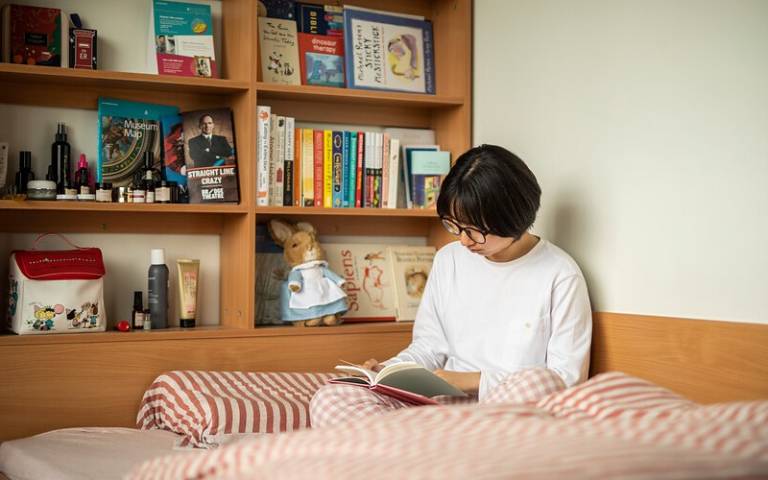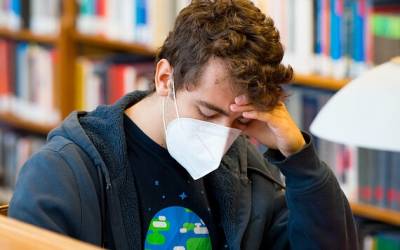Learning and long COVID: what are the risks and what you can do
7 July 2023
Almost half the school pupils with long COVID felt they had fallen behind classmates, a UCL study shows. Many of these students will start university this autumn. Student journalist, Suzanna Chen, examines how long COVID affects students and the support the new cohort may need.

COVID-19 was recently downgraded from a “global health emergency” by the World Health Organisation (WHO), but persistent health consequences have affected the lives of around one in 13 (7.8%) young people who contracted the virus.
Philip, who studies BA History at UCL, came down with COVID right after Welcome Week this year. He said: “I was out of uni for three weeks. It was debilitating. For a few days, my temperature went up to 40 degrees, and I even called 999 a few times.”
I'm always exhausted, even when I’ve just woken up
But while severe symptoms went away after a few weeks, Philip noticed that his health had never truly returned to how it was before the drastic downturn.
“I'm always exhausted, even when I’ve just woken up. My concentration and focus have also been greatly affected since then, which sucks since I got it just as I was returning from a year-and-a-half of interruption and finally getting back on ADHD medication and antidepressants that worked for me. It felt like starting over again,” he said.
it’s still difficult to definitively diagnose long COVID“
“Long COVID” is often used colloquially as an umbrella term for any prolonged health complications after COVID infections. While systematically and accurately defining this “emerging new condition” is a work in progress for researchers, standardised definitions for medical professionals have been introduced by the National Institute for Health and Care Excellence (NICE).
NICE uses long COVID to describe when patients experience or develop health symptoms over four weeks after being infected with the coronavirus. The condition can be further classified as “ongoing symptomatic COVID-19” for when symptoms last between four and 12 weeks and “post-COVID syndrome” for when symptoms continue beyond 12 weeks.

These symptoms might include the development or worsening of mental health conditions, cognitive and attention difficulties, physical weakness, and cardiovascular and respiratory issues like irregular heartbeat and shortness of breath. According to a recent study by UCL and the University of Exeter, the most common symptom, fatigue, can affect patients’ quality of life more than some cancers.
But most current research into long COVID is based on participants who self-report long COVID symptoms rather than ones clinically diagnosed with “ongoing symptomatic COVID-19” or “post-COVID syndrome.” This is because despite attempts at clarification, it’s still difficult to definitively diagnose long COVID. This is due to factors like a lack of consistent screening tests and studies with control groups to identify long COVID symptoms and distinguish it from other diseases.
“What is less ambiguous about long COVID though, is its ability to affect all aspects of someone’s life, including their studies.
The uncertainty has also made it difficult to track down UCL students with long COVID to speak about their experiences. Philip said: “I can't know for sure if what's been going on with me for the past few months is long COVID or something else, but it's quite likely that's what I'm going through, at least in part.”
What is less ambiguous about long COVID though, is its ability to affect all aspects of someone’s life, including their studies.
A project led by UCL researchers looked into how long COVID can affect the academic performance of over 13,000 young people who were in Year 11 in 2021-22. The findings showed that nearly half (45%) of the young students who reported long COVID symptoms felt they had fallen behind their classmates. Almost three in five (59%) were struggling to catch up with lost learning.
nearly half (45%) of the young students who reported long COVID symptoms felt they had fallen behind
It was also found that pupils with “severe” long COVID also averaged lower on teacher-assessed GCSE than those who didn’t have long COVID. The project is called the COVID Social Mobility and Opportunities Study (COSMO).
“Almost three in five (59%) were struggling to catch up with lost learning
Philip said the findings reflect his experiences too. He thinks long COVID symptoms “definitely” caused him to not be able to study as much and as well as he’s normally able to, “especially compared to coursemates.”
Dr Jake Anders is an Associate Professor in Educational and Social Statistics at UCL’s Centre for Education Policy and Equalising Opportunities (CEPEO). He is also the Principal Investigator of COSMO. Reflecting on the findings about long COVID’s academic consequences, he thinks it “seems likely” that young people at university experience them too.
“universities should be looking at ways in which they can support young people who feel they have fallen behind due to long COVID
“Unlike lost learning due to wider disruption, if someone has long COVID and is unable to engage with their studies as a result, this is likely to be highly disruptive to their learning experience regardless of their educational setting,” he said.
Additionally, Dr Anders hopes universities can “be sympathetic” to the physical and academic challenges faced by students experiencing long COVID and provide necessary support.
“Certainly, universities should be looking at ways in which they can support young people who feel they have fallen behind due to long COVID. [The students’] physical exhaustion and issues with concentration mean they may well need longer to complete some or all parts of their studies. This may mean being flexible with assignment deadlines, for example, as well as being supportive if students need to suspend their studies for a period where possible.”
“many of the young people Dr Anders and the COSMO team are following in their studies will be incoming students this September.
The conversation around appropriate support for university students with long COVID should be increasingly relevant, as many of the young people Dr Anders and the COSMO team are following in their studies will be incoming students this September.
Dr Anders said: “We recently completed our second data collection, which was completed while many young people are in the run up to doing their A levels. We hope our findings illuminate many of the challenges still facing this cohort of young people, around half of whom will be starting university next year. As a result, the findings are highly relevant for universities seeking to understand the unequal experiences of this incoming cohort and, as a result, ways in which their teaching needs to respond to their ambitions and needs.”
COVID-19 is still a virus that can cause serious health consequences for everyone, but there are measures in place to keep the UCL student and staff communities safe on campus. You can also help by taking recommended actions that prevent the spread of infections.
If long COVID is affecting your health and studies, please reach out to Student Support and Wellbeing and check out the NHS long COVID resources.

Further information and resources
- If you need support, please reach out to Student Support and Wellbeing
- NHS resources on long COVID
- Keeping safe on campus
- COVID Social Mobility and Opportunities Study (COSMO) is funded by the Economic and Social Research Council (ESRC) as part of UK Research and Innovation’s rapid response to COVID-19
- UCL convalescence long COVID Study
- UCL News: Almost half of young people with long COVID reported lost learning
- UCL News: Up to one in six people with Covid-19 report long Covid symptoms
- UCL News: Long COVID can impact fatigue and quality of life worse than some cancers
About the author
Suzanna Chen is a second-year undergraduate student in the Arts and Sciences programme. As a Chinese-Canadian student with disabilities, she is passionate about bringing her unique perspective and shining a light on lesser-acknowledged topics as a student journalist – and hopefully as a professional one in the future. As well as being part of the UCL VPEE Student Journalism Scheme, she is also Editor-in-Chief of the London Tab.
 Close
Close

